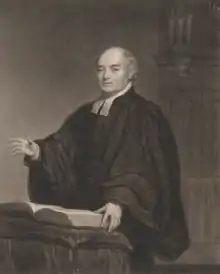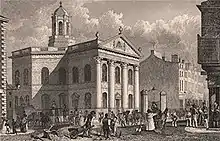John Yates (minister)
John Yates (1755–1826) was an English Unitarian minister, for over 30 years at the Paradise Street Chapel in Liverpool. He was an abolitionist, a supporter of radical causes, and a member of the Roscoe circle of progressives.[1][2]

Life
He was born in Bolton, the only child of John Yates, a schoolmaster. He was educated at Bolton Grammar School, and from 1772 at Warrington Academy.[1]
In 1777 Yates became the minister of the Kaye Street Chapel, Liverpool.[1]

With his friend William Shepherd, who tutored his children, Yates was active in Liverpool's radical politics. He preached against the Atlantic slave trade in 1788, offending some of his congregation.[1] He took part in the private meetings of the "Friends of Freedom" from 1789, a group including William Roscoe and William Rathbone IV.[3] Yates and his congregation moved to the Paradise Street Chapel in 1791.[1]
Yates was active on the committee of The Lyceum.[4] He was one of the supporters of Manchester College.[5] He died on 10 November 1826 at Dingle Head.[1]
Family
In 1777 Yates married Elizabeth Bostock née Ashton, widow of the physician John Bostock the elder (1740–1774), a student of William Cullen.[1][6] She was a daughter of the merchant John Ashton (1711–1759), and mother of John Bostock the younger. John and Elizabeth had a family of five sons and three daughters.[1]
The sons were:
- Joseph Brooks Yates (1780–1855), merchant and plantation owner. John Yates had a covert interest in France, Fletcher & Co., in which Joseph Brooks Yates became a partner in 1801.[7]
- John Ashton Yates (1781–1863), politician.[8]
- Richard Vaughan Yates (1785–1856), donor of Prince's Park to the inhabitants of Liverpool.[8]
- James Yates (minister) (1789–1871), Unitarian minister.[8]
- Pemberton Heywood Yates (1791–1822).[8]
The daughters were Elizabeth, Anna Maria (1787–1866) and Jane Ellen (1794–1877).[9][10] Anna and Jane were commemorated by a tablet in Toxteth Unitarian Chapel.[11]
Notes
- Webb, R. K. "Yates, John". Oxford Dictionary of National Biography (online ed.). Oxford University Press. doi:10.1093/ref:odnb/63410. (Subscription or UK public library membership required.)
- Watts, Ruth (2014). Gender, Power and the Unitarians in England, 1760-1860. Routledge. p. 68. ISBN 978-1-317-88862-8.
- Dellarosa, Franca (2015). Talking Revolution: Edward Rushton's Rebellious Poetics, 1782-1814. Oxford University Press. pp. 44–45. ISBN 978-1-78138-748-1.
- Brooke, Richard (1853). Liverpool as it was During the Last Quarter of the Eighteenth Century. 1775 to 1800. J. Mawdsley and son. p. 92.
- Chapple, John (1997). Elizabeth Gaskell: The Early Years. Manchester University Press. p. 31. ISBN 978-0-7190-2550-1.
- Stephen, Leslie, ed. (1886). . Dictionary of National Biography. 5. London: Smith, Elder & Co.
- "France, Fletcher & Co., Legacies of British Slave-ownership". www.ucl.ac.uk.
- Lee, Sidney, ed. (1900). . Dictionary of National Biography. 63. London: Smith, Elder & Co.
- Burke, Sir Bernard (1863). A Genealogical and Heraldic Dictionary of the Landed Gentry of Great Britain and Ireland. Harrison. p. 1718.
- Jevons, William Stanley (1973). Papers and Correspondence of William Stanley Jevons: Volume 2: Correspondence, 1850-1862. Springer. p. 110 note 3. ISBN 978-1-349-00714-1.
- Valentine David Davis, Richard Mather (1884). Some Account of the Ancient Chapel of Toxteth Park, Liverpool, from the Year 1618 to 1883, and ... Henry Young. p. 53.